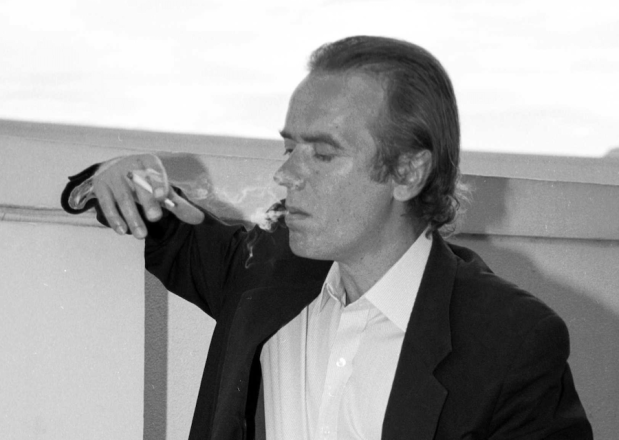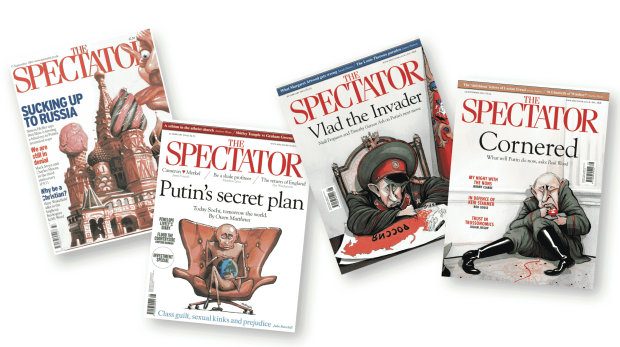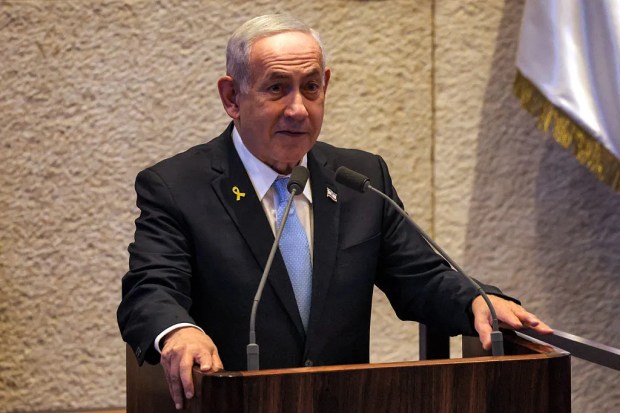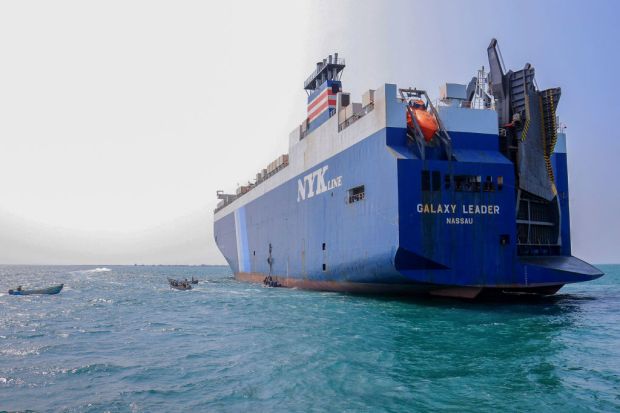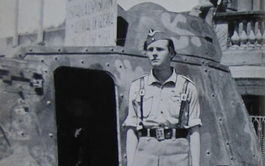This morning, two decades ago, ‘Operation Iraqi Freedom’ began. A bombing campaign of ‘shock and awe’ was launched, with George W. Bush promising to ‘disarm Iraq and to free its people’. In the 20 years since, some of The Spectator’s best writers have wrestled with the Iraq war. Below are extracts from some of their pieces, which you can find on our fully-digitised archive:
The case for war
‘What’s the real long-term war aim of the United States? I’d say it’s this — to bring the Middle East within the civilised world. How do you do that? Tricky, but this we can say for certain: you’ll never be able to manage it with the present crowd — Saddam, the Ayatollahs, the House of Saud, Boy Assad, Mubarak, Yasser. When Amp Moussa, secretary-general of the Arab League, warns the BBC that a US invasion of Iraq would ‘threaten the whole stability of the Middle East’, he’s missing the point: that’s the reason it’s such a great idea.’
Mark Steyn, ‘A war for civilisation’, 10 August 2002
‘Weapons of mass destruction or not, there is a perfectly good case for overthrowing Saddam. Ultimately, international stability is served not by being tough on asylum-seekers but by being tough on the causes of asylum-seekers; namely, those brutal regimes which threaten their neighbours, care nothing for UN resolutions and send floods of refugees fleeing to the rest of the world. We can’t tackle them all, but it will send a strong message to the rest if we deal with Saddam.’
The Spectator, ‘The case for action’, 10 February 2003
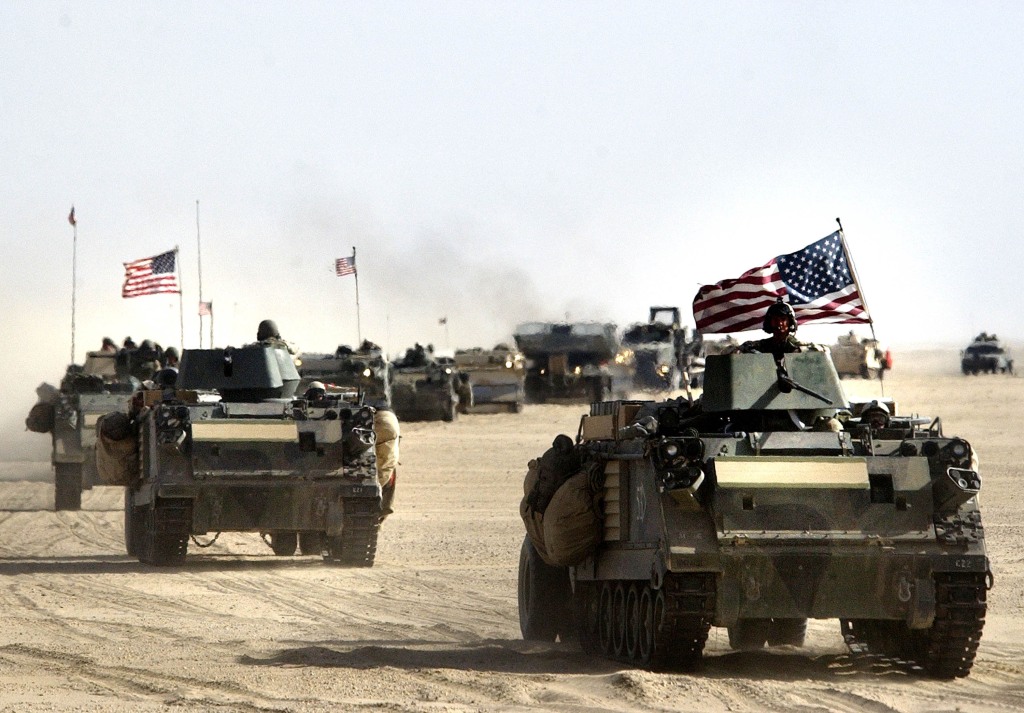 Credit: Getty Images
Credit: Getty Images
The case against
‘After ten years of the most savage embargo of modern times — not to mention the sporadic bombing raids to enforce the absurd no-fly zones — it is time to say enough is enough. The Iraqis, a proud and hospitable people, have surely paid too high a price for the crimes of their leader. Let us hear no more of the ‘weapons of mass destruction’ nonsense, no more of sanctions, and certainly no more of planned bombing campaigns. The best way to ensure peace throughout the whole region, for Arab, Christian and Jew alike, is to welcome Iraq back, unconditionally, into the international community.’
Neil Clark, ‘Hands off Iraq’, 30 March 2002
‘Think for a moment about these people. They are soldiers, airmen, police offers, magistrates, civil servants, scientists, small-time politicians, people not unlike you and me. They are not monsters, they are not wicked, and the fanaticism of the regime they serve and fear, though it lies heavy on their lives, does not define their lives. By day they serve the government which employs them, but at the end of each day they return to wives and children, hopes and fears, gardens, motor cars, property and savings. They do not want to die.’
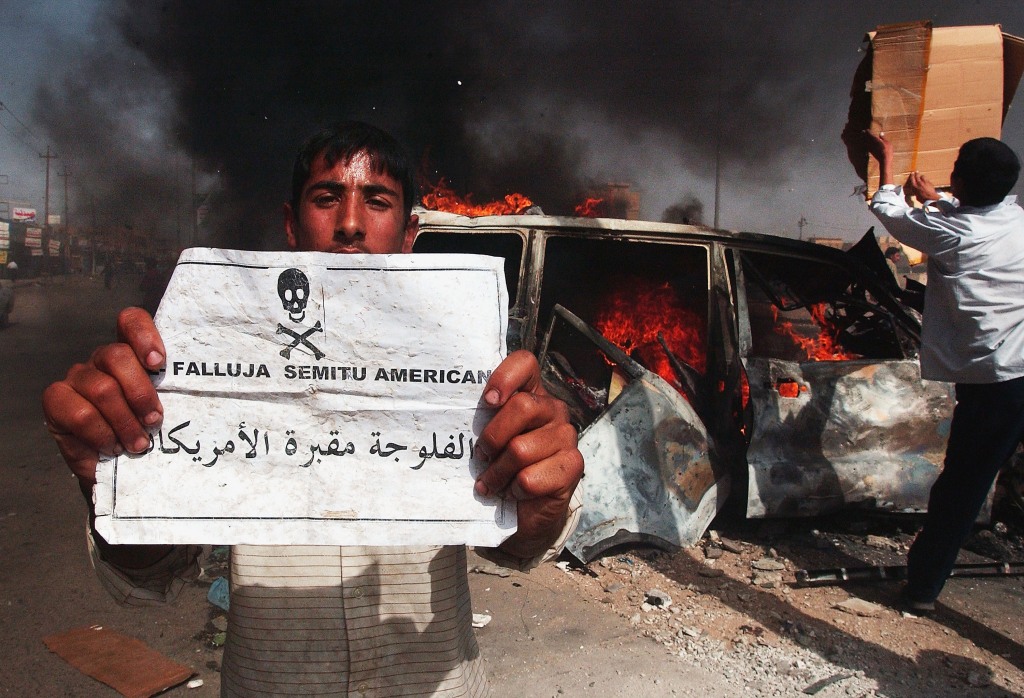 Credit: Getty Images
Credit: Getty Images
The American Leviathan
‘Hobbes valued liberty as much any intellectual today, and prized his own, which was often threatened by the censor. He made friends with the elderly Galileo and held him in veneration. But he was sensible enough to realise that liberty was useless without safety. He would have noted that liberty is most generously nourished, and generally enjoyed, in the United States, which has unmatched armed forces and the readiness to use them, and he might have sardonically observed that all free thinkers throughout the world are ultimately parasitical on American power to uphold freedom against despotism and darkness. He compared anarchy and the fear it breeds to a state of war, and noted that war does not have to be continuous: for war fear to be engendered it is enough to know that anarchic force can and will be used at any time, unrestrained and unpunished. That is precisely the future mankind will face, unless America takes on the Leviathan role. Once fanaticism — and there are other forms besides Islamic hatred of the West — is conceded its right to murder the innocent by the default and cowardice of the law-abiding powers, international intercourse will diminish, trade and industry will decline, what is desired will be taken by force or, if envied, wantonly destroyed. Nothing will flourish except killing, starvation and disease — and, to quote Hobbes, there will be ‘No arts; no letters; no society; and which is worst of all, continual fear, and danger of violent death; and the life of man, solitary, poor, nasty, brutish, and short’.’
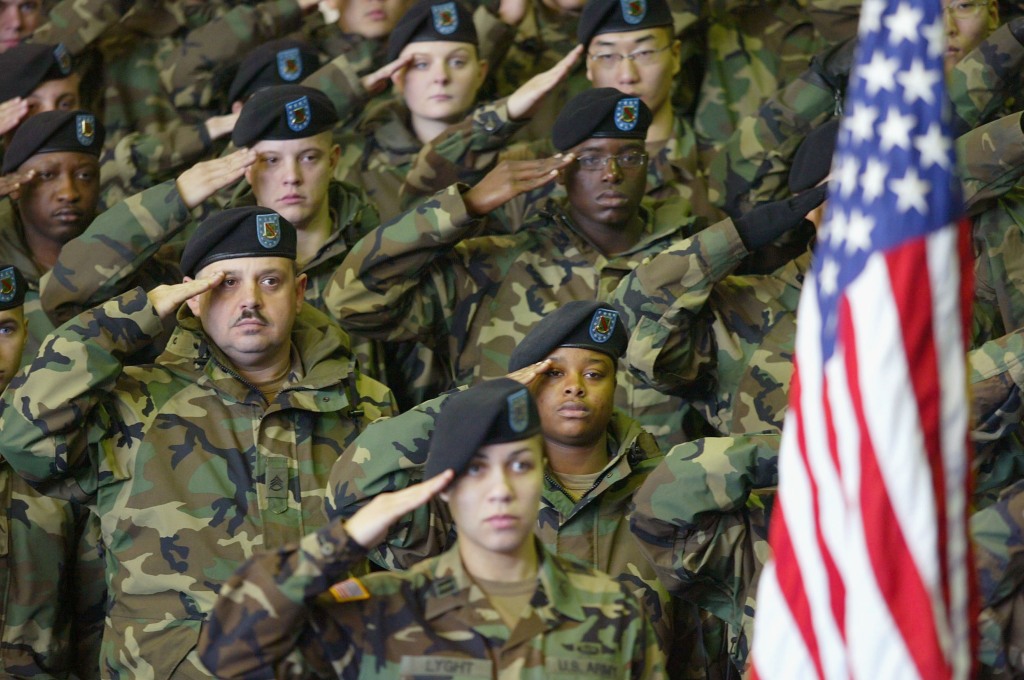 DAEGU, SOUTH KOREA – FEBRUARY 4: U.S. soldiers salute the flag of the USA during a welcome home ceremony for their colleagues who were part of a Task Force, deployed from South Korea to Iraq on October 2004, at U.S. Army Camp Walker on February 4, 2005 in Daegu, South Korea. Members from the Task Force participated in numerous operations at Camp Bucca, a detention facility, and successfully escorted of over 2,000 detainees from Baghdad to Camp Bucca. (Photo by Chung Sung-Jun/Getty Images)
DAEGU, SOUTH KOREA – FEBRUARY 4: U.S. soldiers salute the flag of the USA during a welcome home ceremony for their colleagues who were part of a Task Force, deployed from South Korea to Iraq on October 2004, at U.S. Army Camp Walker on February 4, 2005 in Daegu, South Korea. Members from the Task Force participated in numerous operations at Camp Bucca, a detention facility, and successfully escorted of over 2,000 detainees from Baghdad to Camp Bucca. (Photo by Chung Sung-Jun/Getty Images)
In Iraq
‘So would Iraqis dance in the streets if there were ‘regime change’? Not according to the bishop: ‘People say the President is doing his best for the country.’ Saddam’s support is especially strong among the poor. But that it is a dictatorship, there is no doubt: a sort of magnetic field of fear seems to surround the very use of Saddam’s name, and on the rare occasions when people refer to him, they use euphemisms like ‘the leadership’. Any dissent can be expressed only in private and only to people one trusts. It goes without saying that the press is totally controlled, although the same is true of most Middle Eastern countries. Many Iraqis — who are, by the way, among the kindest and most charming people I have ever met — resent the oppression they suffer at the hands of foreign states more than that practised by their own. One professional explained it like this: ‘If you mind your own business, you are fine. This regime may be bad, but all over the Third World people are afraid of the state. Iran and Saudi Arabia are far worse than here. There is only one real Iraqi opposition figure, the exiled Ayatollah Sader. He can speak to millions. But I could never live under the mullahs. If Saddam were deposed and the Islamists came to power here, I would seek political asylum in Britain.’ And like all Iraqis, he smiled winningly.’
John Laughland, ‘We will not surrender’, 21 September 2002
‘Iraqi resistance is not just about fear; it’s also about self-respect. People may want to be free, but they don’t want to be freed like this. When they win their first victory, the allied soldiers must display respect. They must consult, must talk to people ,must not shun them as potential suicide bombers. The British get this. The Americans do not.’
Andrew Gilligan, ‘Must we flatten Baghdad?’, 5 April 2003
‘There is gunfire the whole time in Baghdad. It barks around every street corner. Every night is enlivened by the rippling and popping, as if someone were tearing a sheet a few feet away. Within the space of the last half-hour, I had slunk past a ten-year-old with an AK47 over his shoulder, chewing the fat with his dad in the door of the shop. Just five minutes ago I had flinched when another shopkeeper cocked his automatic in my face to show how he dealt with the plague of thieves. But in my three days in Baghdad, this was easily the scariest moment, and the one time I really wished I had bothered with the flak jacket kindly loaned to me by Fergal Keane of the BBC. ‘You!’ screamed an American, whose stitched helmet name-tape proclaimed him to be Kuchma, blood-type A neg. ‘Who are you? Go away! No, wait, give me that,’ he said, shaking with anger when he saw my camera. ‘Give me that or I will detain you.’
I refused; but it was only a couple of minutes before Kuchma and I had calmed each other down. He explained to me the huge pressures his men were under, trying to keep order in a city with no recognised authority, a gun under every Iraqi pillow, and with only a fraction of the troops necessary. I apologised, as we shook hands, for accidentally interfering with his work. I gabbled some congratulations on the amazing achievement of his men and the rest of the American forces.’
Boris Johnson, ‘The fear, the squalor … and the hope’, 3 May 2003
‘Basra — abandoned by the British — had to be liberated by American arms and Iraqi endeavour. I visited the city a few weeks afterwards, accompanying Des Browne, then Defence Secretary. He said that he wanted to be able to have tea in Basra, as a symbol of its return to peace. It was as if Britain could somehow claim credit for the new security situation. Even to have tea, the military had to close down every street within half a mile of the café. I spoke to a local who had some English. ‘You British must feel ashamed of what you did here,’ he said — more in sympathy than in anger. ‘Now, you must go.’’
Fraser Nelson, ‘As Basra slid towards hell, Blair looked the other way’, 30 January 2010
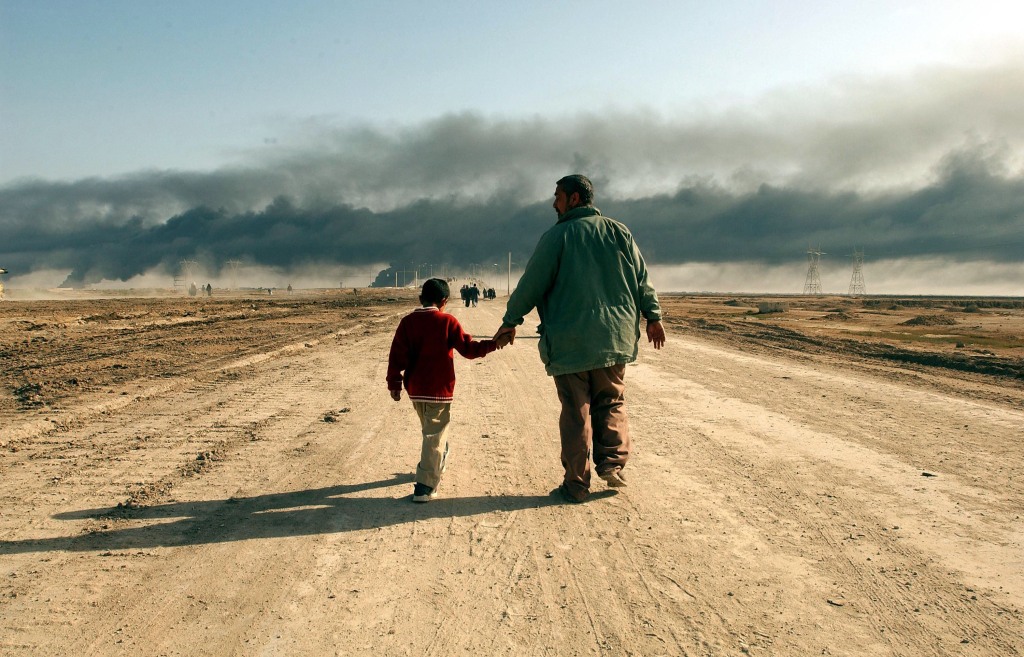 Credit: Getty Images
Credit: Getty Images
The invasion
‘I am writing this from a place which may well no longer exist by the time you read it. All the journalists remaining at the Iraqi ministry of information, compulsory base for the Baghdad press corps, have been warned that the building is a legitimate target for extensive remodelling by the US Air Force. The more sensible among us have believed the advice. On the roof, the empty tents of the American television networks flap in the wind, their safari-suited correspondents long departed for the Jordanian border. Like the population at large, the press pack has appreciably thinned.’
Andrew Gilligan, ‘Waiting for the bombs to fall’, 22 March 2003
‘I used to be amused and appalled by the Pentagon-speak which developed during the Vietnam war. But now the almost Stalinist euphemisms and aggressive acronyms have given way to a less extreme form — a military version of corporate-speak. Perhaps this is Donald Rumsfeld’s influence. The new form of allied blitzkrieg is termed Rapid Decisive Operations. A few years ago, it would have been Rod or Raid. But these terminological subtleties make little difference to the grunt on the ground: he is just trying to cope with the shock of war. ‘You go through all that training,’ said one American the other day after coming under fire for the first time. ‘You know you are in Iraq, but until you hear bullets and see those tracers, you don’t think any of it is real. I can remember thinking, ‘I can’t believe it. They’re taking on the might of the American army.’’ Every generation of soldiers is disorientated, if not terrified, when they first come under hostile fire. But I strongly suspect that the ‘battle virgins’ of today find it even harder, if only because of the hours they have spent on electronic training simulators, to say nothing of all the amusement-arcade games, zapping an unlethal enemy, in their spare time. The reality of war could hardly be more different, especially when systems go down.’
Antony Beevor, Diary, 5 April 2003
‘For two weeks now the military has been telling us, as it traipses from town to town, that, oho, it’s just discovered some dodgy-looking canisters in a warehouse or in a cupboard under the stairs or at the back of the refrigerator. And then later it’s been quietly admitted that the canisters were actually full of halva, or feta cheese, or figs.
Gas! Gas! Gas! the army cried on Day One, and dived for cover as some missiles exploded 500 yards away. But the missiles, it transpired, weren’t full of poisonous gas. They weren’t full of very much at all. They did no damage: nobody was hurt. They weren’t even Scud missiles, which everybody assured us they were at first. They were very, very short-range missiles indeed. They were a wholly new development of modern warfare: Weapons of No Destruction whatsoever.’
Rod Liddle, ‘Is that a weapon of mass destruction or a tin of feta cheese?’, 12 April 2003
‘For the first time during the region’s 6,000-year history Iraqis had gone to the polls in a free and fair election. True democracy had arrived because Saddam had been toppled. What a stunning triumph for freedom and the human spirit which had for so long been crushed by a madman in Baghdad! Surely gainsayers cannot deny this basic human right and say the invasion was not worth it?’
Emma Nicholson, ‘The Iraq war: Ten years on, was it worth it?’, 16 March 2013
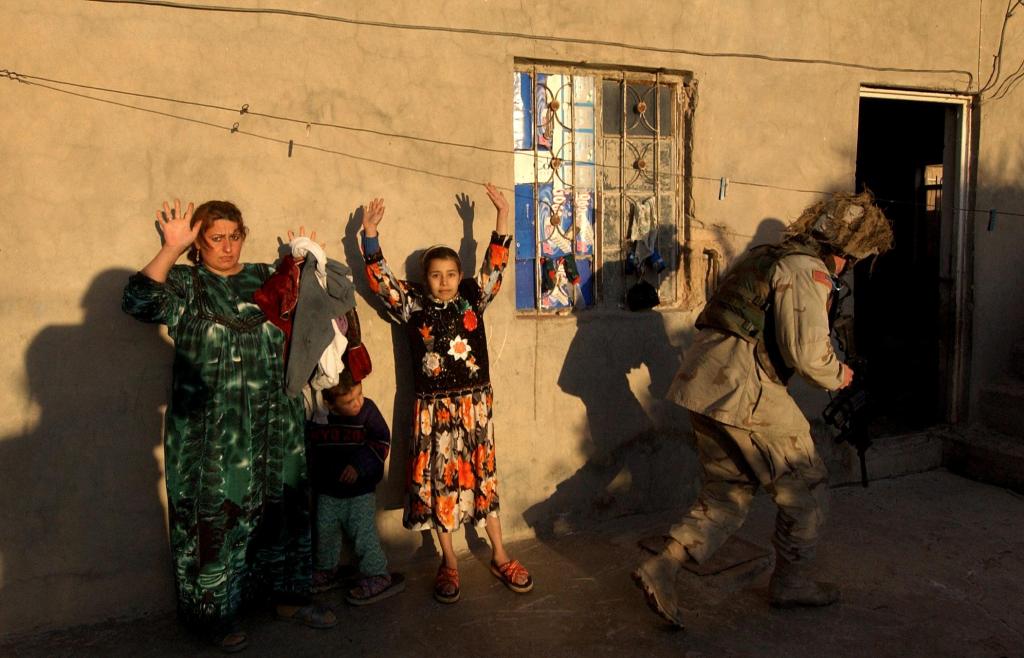 An Iraqi woman with her children raise their hands as US soldiers from the 4th Infantry division search their house in Tikrit, 180 Kilometers (110 miles) north of Baghdad, 19 December 2003. US soldiers captured Saddam hiding in a hole at a farm outside his hometown of Tikrit on December 13. AFP PHOTO/JEWEL SAMAD / AFP PHOTO / JEWEL SAMAD (Photo credit should read JEWEL SAMAD/AFP via Getty Images)
An Iraqi woman with her children raise their hands as US soldiers from the 4th Infantry division search their house in Tikrit, 180 Kilometers (110 miles) north of Baghdad, 19 December 2003. US soldiers captured Saddam hiding in a hole at a farm outside his hometown of Tikrit on December 13. AFP PHOTO/JEWEL SAMAD / AFP PHOTO / JEWEL SAMAD (Photo credit should read JEWEL SAMAD/AFP via Getty Images)
The special relationship
‘Tony Blair’s devout Atlanticism may actually represent the special relationship’s last gasp. For a strategic partnership needs more to sustain it than an affinity between the principals and the self-interest of a few professional elites. It requires a congruence of national interests. It also needs some convergence of popular attitudes. By both those criteria, the Anglo-American alliance is surely living on borrowed time.
The Iraq war may not have destroyed Mr Bush and Mr Blair. But it has surely laid bare the asymmetry of the relationship between Washington and London. If the special relationship were a transatlantic flight, they would be in the cockpit. We would be the sleeping passengers. It is surely time to get our foreign policy up off the flatbed.’
Niall Ferguson, ‘Britain first’, 26 September 2004
‘Americans, by and large, would assent to Blair’s characterisation of Britain as the ‘pivotal power’. This is largely because of the public-relations performance of Blair himself. On a day-to-day basis, Blair has pressed the American case with considerably more eloquence than Bush has. Last September, when Bush’s UN resolution showed signs of flagging, it was not any White House-generated spin that provided American hawks with their intellectual case for an Iraq intervention. It was Blair’s speech to Parliament (and his simultaneous release of the 50-page Joint Intelligence Committee dossier) that did it.’
Christopher Caldwell, ‘The Fruits of Victory’, 1 February 2003
‘It is characteristic of those who feel that they have an unmediated line to the Lord that they think that they can make the law themselves. Tony Blair rewrote the rulebook for the Labour party. And this is what he and George Bush are doing in Iraq: their readiness to ignore the procedures of international institutions such as the United Nations is a manifestation of the same sort of arrogance. According to the precepts of natural law, the humility and discipline of religion express a wisdom that is deeper than individual men and women can readily understand. These are boundaries which, as Mr Blair may be about to discover, are impertinent to transgress.’
Peter Oborne, ‘The special relationship between Blair and God’, 5 April 2003
‘A contrived and phony version of history has yielded a demented strategy. A Churchillian Bush imagined that Operation Iraqi Freedom might provide his ‘Finest Hour’ — an act of liberation that would jumpstart the democratic transformation of the Greater Middle East. Instead Iraq has become Bush’s Gallipoli, a sinkhole into which he has not yet ceased to pour American treasure, military strength and credibility. Although Bush succeeded in toppling his stand-in for Hitler (while Osama bin Laden, the actual architect of 9/11, still remains at large), the Iraqis have refused to follow their assigned script. Unlike the compliant Germans after 1945, they have not submitted. Instead they resist, seeing their liberators as an army of occupation and pursuing their own political agenda which has a lot more to do with sectarian divisions than Jeffersonian ideals.’
Andrew J. Bacevich, ‘This is not World War Three — or Four’, 22 July 2006
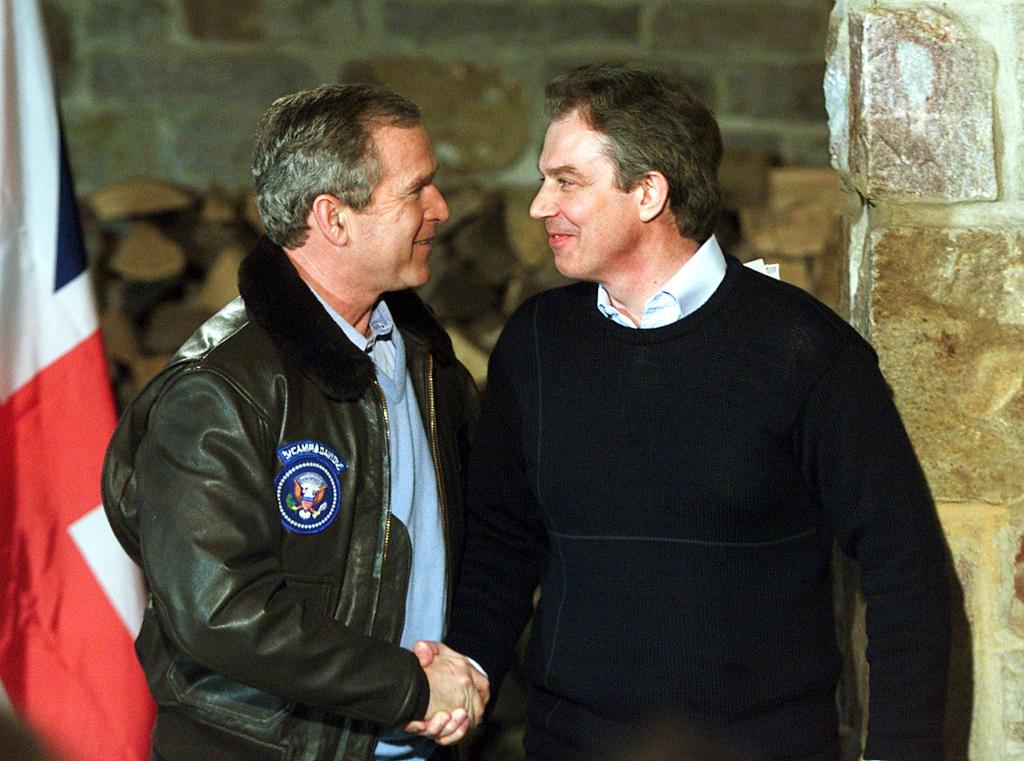 THURMONT, UNITED STATES: US President George W. Bush (L) and British Prime Minister Tony Blair shake hands after a joint press conference 23 February 2001, in Thurmont, Maryland, down the road from the presidential retreat Camp David. Blair and his wife are scheduled to remain overnight at Camp David with the Bushes. AFP PHOTO MARIO TAMA (Photo credit should read MARIO TAMA/AFP via Getty Images)
THURMONT, UNITED STATES: US President George W. Bush (L) and British Prime Minister Tony Blair shake hands after a joint press conference 23 February 2001, in Thurmont, Maryland, down the road from the presidential retreat Camp David. Blair and his wife are scheduled to remain overnight at Camp David with the Bushes. AFP PHOTO MARIO TAMA (Photo credit should read MARIO TAMA/AFP via Getty Images)
Blair
‘The public debate that led up to this war has established a great deal. There is no evidence of more than the loosest links between Iraq and al-Qa’eda, none at all that Iraq has ever exported weapons of mass destruction. The assertion by Robin Cook, in his distinguished resignation speech, that ‘Iraq probably has no weapons of mass destruction in the commonly understood sense of the term’ carries weight, coming from someone who has seen secret Cabinet papers. Everyone agrees that Saddam is a very bad man, though no worse than he was five or ten years ago when we were content to let him be. But Tony Blair, producing one of his finest performances, turned Parliament round on Tuesday. He has secured his domestic base. Now it is out of the hands of the politicians. Their fate, everyone’s fate, is in the hands of the generals.
‘It was Blair’s messianic neoliberal evangelism, a mixture of arrogance, naivety and pig ignorance, which underpinned his disastrous foreign policy. That, and a remarkable sycophancy towards the USA, regardless of who was running it at the time. Blair’s view of the world was that of a simpleton, yet it persists among neoliberals to this day — not least William Hague, who cannot open his mouth without demanding that we intervene somewhere we have no right or cause to intervene. In short, the neoliberal view was that the end of history really had arrived and that all the peoples of the world desired pretty much the same thing: a nice secular democracy with gender equality, decent drains and everyone living in peace.’
Rod Liddle, ‘The neocolonialist legacy of Tony Blair’, 28 August 2021
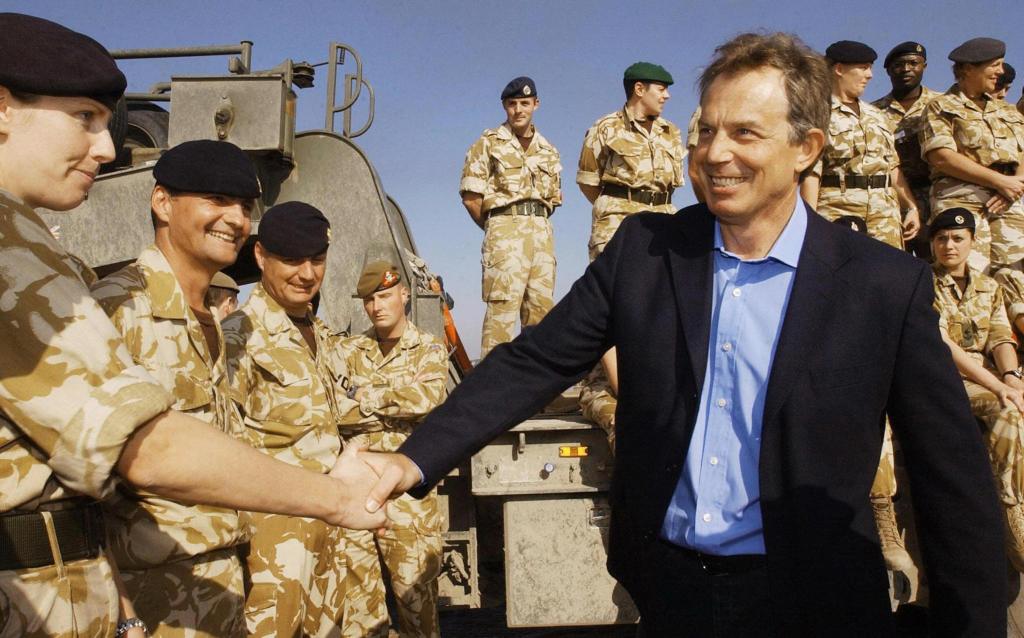 Credit: Getty Images
Credit: Getty Images
The Conservative party
‘The idea that naked force can create human freedom is itself a left-wing idea. Even more socialist are the war faction’s contempt for the sovereignty of nations and their unashamed belief that ends justify means. No wonder that the war’s hottest-eyed supporters on both sides of the Atlantic are ex-Marxists who have lost their faith but have yet to lose their Leninist tendency to worship worldly power. Yet ranged alongside them are Tories who are supposed to stand for the gentler and more modest cause of faith and nation, Church and King.
Why aren’t they embarrassed? Why aren’t they suspicious? Why doesn’t the enthusiasm of Mr Blair make them wonder if this is right rather than imagining there are two, wholly contradictory Mr Blairs in the same body?’
Peter Hitchens, ‘Not in our name’, 29 March 2003
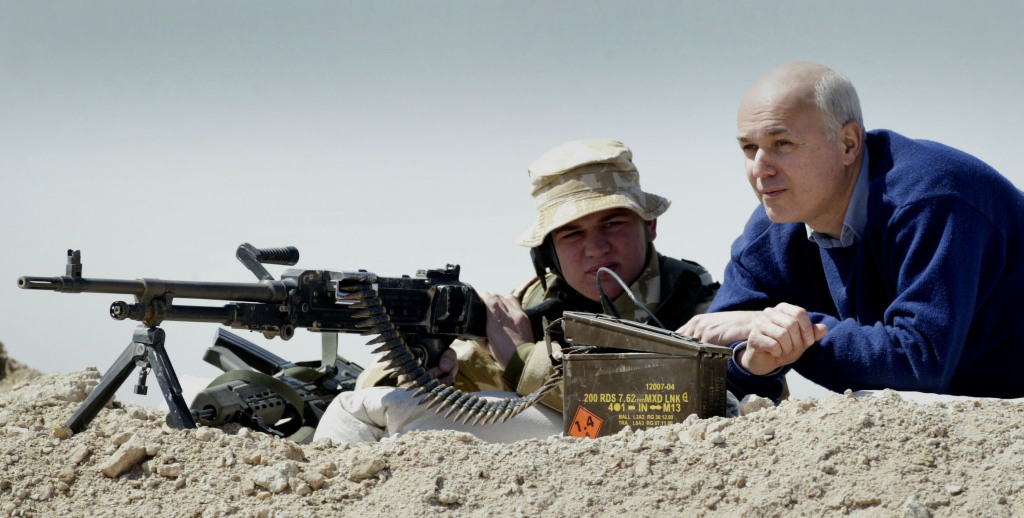 Credit: Getty Images
Credit: Getty Images
Baghdad falls
‘Coalition forces entered Baghdad after continued bombing and the disruption of electricity supplies. There was little immediate organised resistance. The international airport was secured and, after forays into the city, the Jumhuriya and Sijood palaces and the military airfield were taken. Cheering crowds greeted American tanks moving into the city from the east. There was widespread looting. An American bomber aircraft dropped four 2,000lb smart bombs on a restaurant in the Mansur district of the city on hearing the President Saddam Hussein was there, but he was thought to have escaped.’
Portrait of the week, 12 April 2003
‘As President Bush has said, this war has a variety of targets and requires a variety of strategies. No one I know wants to wage war on Iraq and Syria, but there is now a clear recognition that we must defend ourselves against them. They are an integral part of the terror network that produced 11 September. Left undisturbed they will kill us in Iraq and Afghanistan, and will mount new attacks on our homelands. We cannot give them time to organise these attacks, all the while developing the weapons we all properly dread. But unlike Iraq, there is no need for a military campaign. Our most potent weapons are the peoples of Syria and Iran, and they are primed, loaded and ready to fire. We should now pull the political lanyards and unleash democratic revolution on the terror masters in Damascus and Tehran.’
Michael Ledeen, ‘The end of the beginning’, 12 April 2003
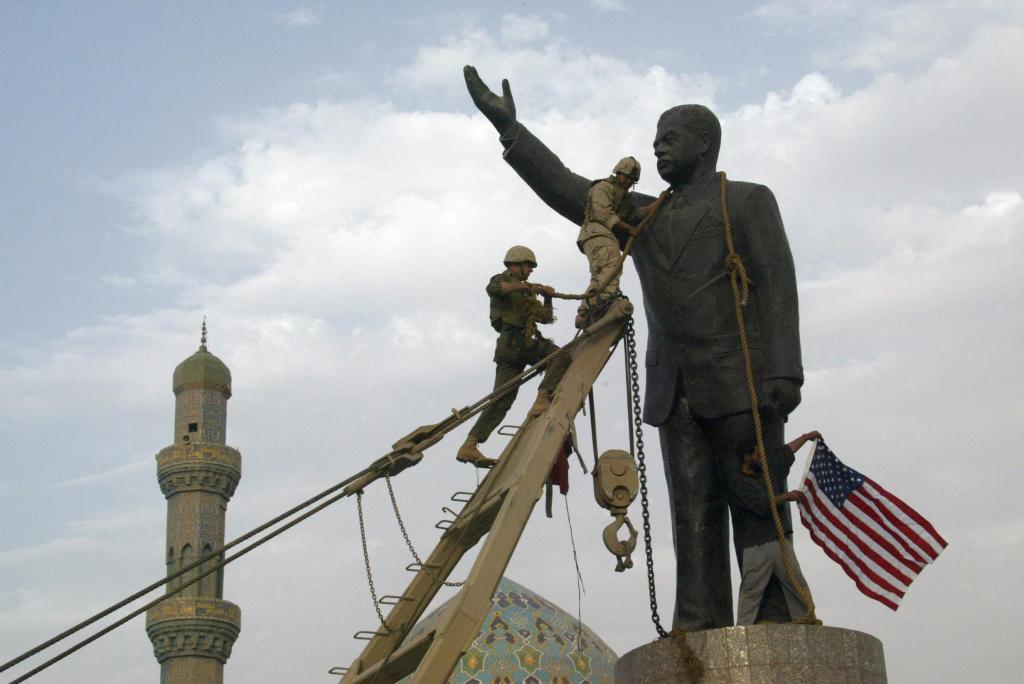 Credit: Getty Images
Credit: Getty Images
The death of David Kelly
‘If the government had shown the same discretion as the BBC and kept Dr Kelly’s name private, he would be alive today. But ministers bandied his name about as a pawn in their war against the BBC, with the consequences we know now. It is still worth bearing in mind that the Kelly affair and the BBC row are no more than a sideshow in a much bigger and more important debate. That is about whether Tony Blair was speaking the truth when he told the British public that he was sending British troops to die in Iraq because of the threat posed by Saddam Hussein’s weapons of mass destruction. Dr Kelly felt that the British government overstated its case, and now he has died because he expressed that belief. And every day that passes, fresh evidence emerges — whether on uranium from Niger or Tony Blair’s 45-minute claim — that he was right.’
Peter Oborne, ‘The fall guy’, 26 July 2003
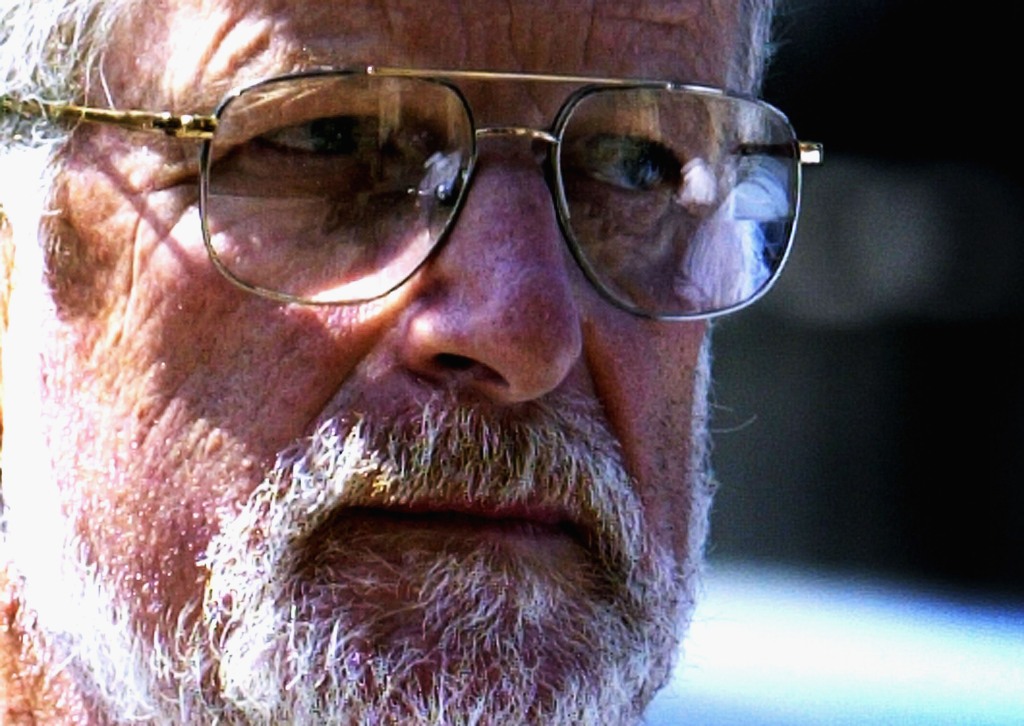 Credit: Getty Images
Credit: Getty Images
The anti-war movement
‘The protest is desperately lacking in vigour. There is no appetite for conflict, no victory plan. The chief tactic is futile commotion — hectic agitation — which merely camouflages indolence and apathy. One obvious gambit — mass disruption of the tax system — has scarcely been mooted, let alone attempted. The deadline for payment fell two weeks ago. What an opportunity. But aside from a handful of genuine mutineers, none of the protesters deemed their cause worthy of a tussle with the Treasury. Why not? It’s not as if they’d have been rounded up and shot as in … er, well, Iraq.
They prefer harmless spectaculars, like Saturday’s march — the Big One — which makes them twinkle with zeal. You can see the attraction. If the weather is benign, it’s a lovely day out. London empties of its cars and shoppers. Restaurants shrug their customers outdoors and lock up for the day. The city’s mighty avenues become rivers of virtuous humanity. All trade ceases. The hated multinationals shroud their windows in wooden boards, as if ashamed of their foul barter. Commerce becomes a coffin. Instead the streets are given over to bongo-drummers and clowns on stilts. Playground fun fills the air. You can hear it, smell it almost, the carnival aroma, the spirit of righteous anger, the whiff of a mob whose mind is settled, whose purpose is beautifully stark: to re-establish justice in a world gone mad. Even the police are cowed and humbled. They brood behind their cordons, fondling their batons in their black-gloved fingers. But don’t be afraid. It’s All Fools’ day. The customs of authority are turned topsy-turvy. You can abuse the law openly if you feel like it. Stroll up to a copper and swear in his face and he’s under orders to let you go on your way. What a balm to the suffering suburban heart. How it cheers the soul to take part in this masquerade of revolution. It purges the iniquities imposed every day by ‘authority’. Everyone goes home refreshed, their consciences reborn. They will stop London certainly. But will they stop the war?’
Lloyd Evans, ‘What do they want?’, 15 February 2003
‘In the face of the uncertainties of life, David Hume thought one had best play billiards. Voltaire suggested we should cultivate our garden. I am with Voltaire. Every news bulletin was shouting at me about war. Bombs, I knew, were raining down on Baghdad. One military correspondent had sent a tape-recording of people screaming in terror. Politicians kept getting up on their hind legs and ranting about liberation (‘They bark of freedom,/Oh I hate the sound,’ wrote John Clare) and the more I heard it the more my hands itched for my new trenching spade and the handles of my wheelbarrow. Affairs of state are my profession but not my life, and I rarely lose sleep about politics, but this month and with this war a cold anger at the stupidity of it all, the awful miscalculations being made and the damage being done, and feelings of useless despair of a quite personal sort, keep returning to trouble me, intruding into everything. I have even thought of joining a protest march — and I detest public demonstrations.’
Matthew Parris, ‘I feel a cold anger at the stupidity of this war’, 5 April 2003
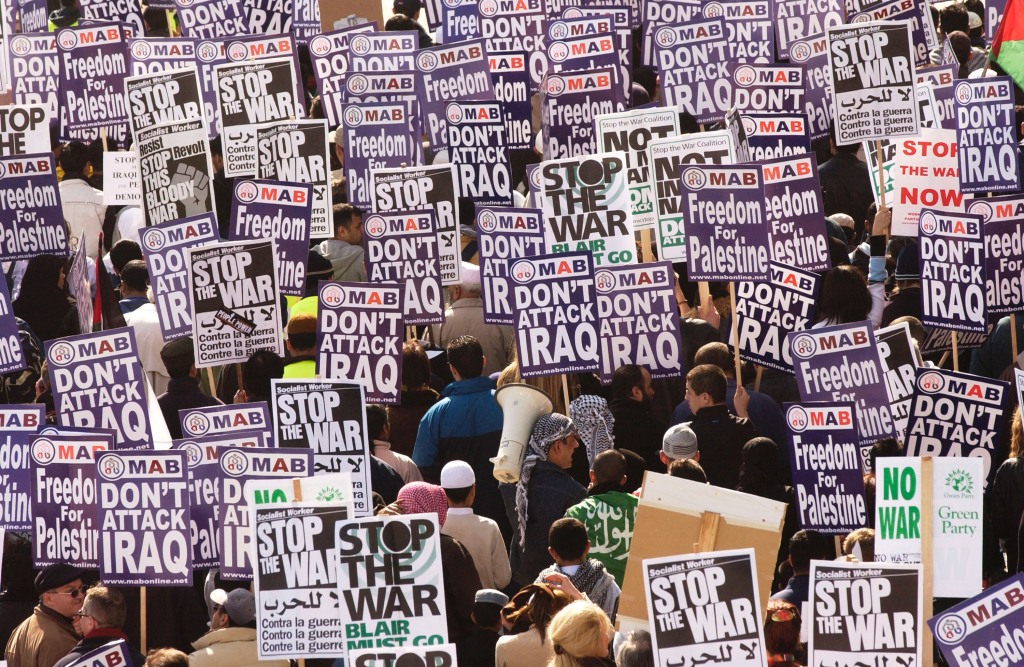 Credit: Getty Images
Credit: Getty Images
Blowback
‘The Iraq war did not create the problem of murderous Islamic fundamentalists, though the war has unquestionably sharpened the resentments felt by such people in this country, and given them a new pretext. The Iraq war did not introduce the poison into our bloodstream but, yes, the war did help to potentiate that poison. And whatever the defenders of the war may say, it has not solved the problem of Islamic terror, or even come close to providing the beginnings of a solution. You can’t claim to be draining the swamp in the Middle East when the mosquitoes are breeding quite happily in Yorkshire.’
Boris Johnson, ‘Just don’t call it war’, 16 July 2005
‘In the absence of other certainties, it’s become common to say: look what happens when men are driven mad by a medieval religion. Look what animals the Islamists have become without reason to light their way. There’s some truth there — but again no easy them and us. A few thousand miles to the west, Christians hack Muslim children to death with machetes in the Central African Republic. In Mexico, atheistic drug cartels leave the beaches strewn with severed heads. The US colonel Kenneth King, who ran a camp in Iraq for both Sunni and Shia inmates, described the feuding between them in gang terms: ‘It’s the Bloods with the Bloods and the Crips with the Crips, that kind of thing.’’
Mary Wakefield, ‘Please, Cameron – no moral grandstanding over Iraq’, 21 June 2014
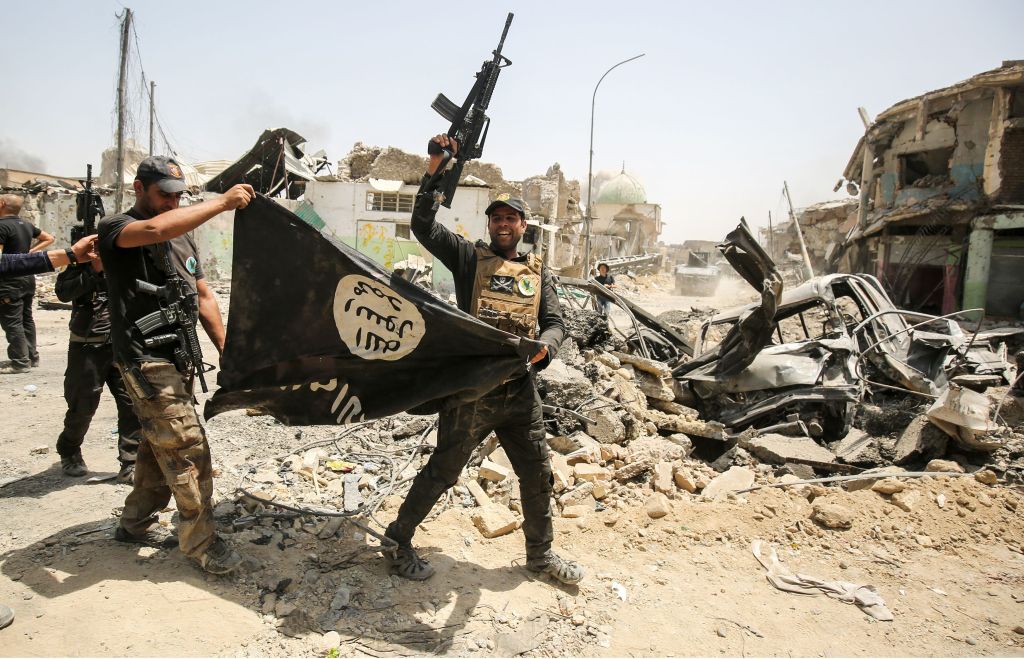 Credit: Getty Images
Credit: Getty Images
Chilcot
‘What we really need is not Chilcot, but an inquiry into how we, the British educated classes (perhaps above all in my trade of journalism), are so easily talked into wars. The overthrow of Colonel Gaddafi in Libya, one of the greatest politico-socio-economic mistakes of the past 50 years, was wildly popular at the time. Those responsible face no threat of being arrested for war crimes by waiters in fashionable restaurants, as happened to Mr Blair. As for Syria, the speed with which the BBC and most commentators became convinced of the need to overthrow Bashar Al-Assad (most of them having hardly heard of him a month earlier) was astonishing. There’s a similar keenness for worse relations with Vladimir Putin, once again based on a strategic and historical grasp so feeble that it makes me, a jobbing scribbler, feel like a mixture of Metternich and Macaulay.’
Peter Hitchens, ‘Forget Chilcot’, 5 September 2015
‘This magazine supported the Iraq invasion and invited sceptics to explain why the world would be a better place with Saddam allowed to continue in power. What we didn’t know then was the calamitous lack of a plan for what would happen once Saddam had been toppled. Difficulties which, as the Chilcot report says, could have been foreseen. We learn that Sir Jeremy Greenstock, when ambassador to Baghdad, concluded that preparations ‘were abject: wrong analysis, wrong people.’ So toppling Saddam created a vacuum, which was filled by sectarian bloodshed and (eventually) the Islamic state.
There is a huge difference between campaigning and governing. When it comes to Parliament making grave decisions such as whether or not to go to war the information put before them should be unimpeachable. Tony Blair treated winning Parliament over to his military adventure in Iraq like just another election to be won. It was an error of judgment for which he, and many others, have suffered ever since.’
The Spectator, ‘The shame of Iraq’, 6 July 2016
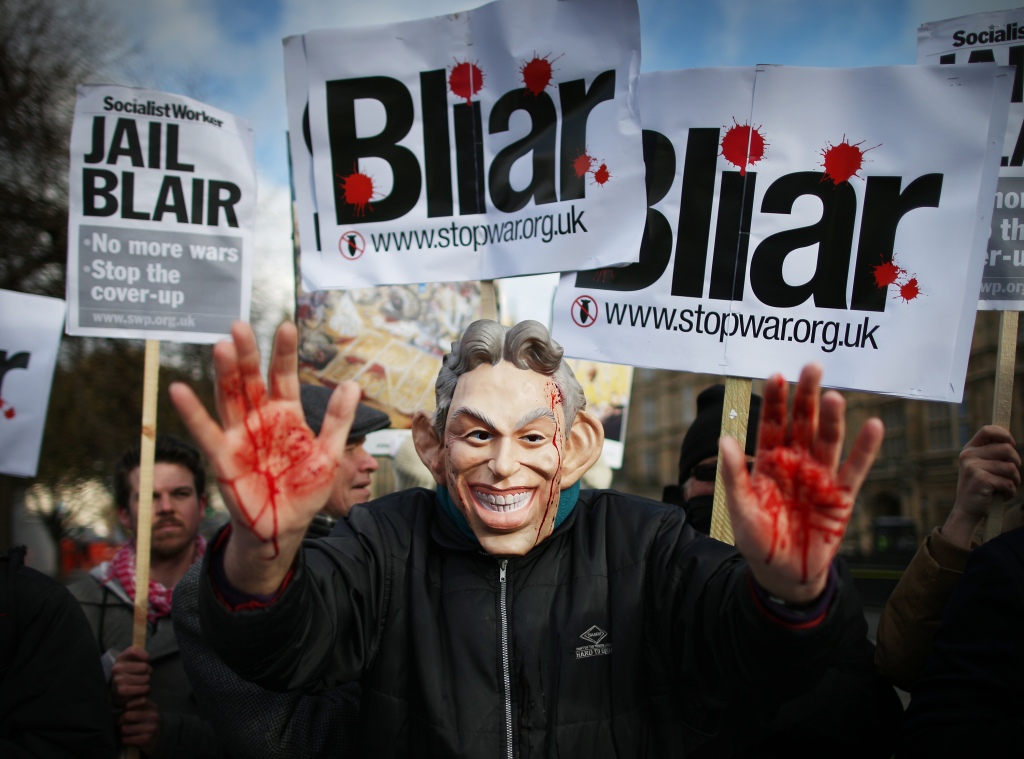 Credit: Getty Images
Credit: Getty Images



